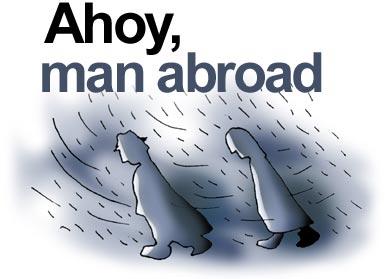 | « Back to article | Print this article |

In London I drank the most expensive tea of my life, made the most expensive telephone call, and had the most expensive pee. Then feeling seriously depressed -- the tea cost me Rs 39, the phone call Rs 31.20, and the pee Rs 15.60 -- I caught the National Express coach to my university town in Dorset county, 106 miles (171 km) away in south-west England.
It was grey and drizzly when I reached Bournemouth. Of course. Not for nothing is it called Sunny Bournemouth.
I tumbled into a taxi. On the broad streets, I could see rain-coated figures plodding along, leaning heavily into the wind. The driver was cheerful and chatty, very unlike the picture of the Englishman I carried in my mind.
At my destination, he happily relieved me of £4.50 and sped off into the wet gloom. £4.50 was Rs 351. Enough for 15 such rides back home, I calculated, reeling under what was clearly an existential truth for most international students.
Since then, Sir Pound has committed more atrocities on my plebeian rupee, claiming 84/85 to one, as opposed to the earlier 78. Now I need to pay the price of 25 haircuts back home for the cheapest trimming (£8) here, the price of two loaves for the cheapest bread (23 pence), the price of four upper-end tickets for the cheapest movie seat And, hell, the price of one Indian lunch for the cheapest English pee (20p).
To make life difficult for its staff and students, the Bournemouth university has scattered itself all over the countryside.
![]()
Have you read?
![]()
![]()
![]()
![]()
No Asians please![]()
God took her baby back![]()
This is for Captain Anuj!![]()
![]()
The main campus is on the city outskirts. The other campus is strewn some two miles away, in bits and pieces near the city centre, a couple of buildings perched atop commercial establishments overlooking major roads.
Neither campus will win an award for architectural beauty. The main campus was undoubtedly built by someone who had a perverse sense of humour, or a serious quarrel with the university administrators, possibly both. Thus, buildings of varying sizes, shapes, colours and antiquity collide into one another or get in each other's way; a few stand apart sulkily and watch the fun; strips of parking area run hither and thither.
Inside this melee is one library (there were two earlier), scores of administrative hideaways, one sports centre (£10 per annum for basic membership), one medical centre (by appointment only: book 48 hours before you have an accident), five restaurants (£1.50 for fish and chips), two pubs (mandatory for all students: a 30-credit unit on practical drinking), one student union office
and seven major lecture halls.
The halls are loosely modelled on the Roman amphitheatre. The lecturers, I suppose, are the gladiators slaying their respective lions, in front of a paying audience.
As the paying audience, you can settle yourself comfortably, stretch your legs across the chair in front and sleep. Some students prefer to do that from time to time, but the majority is content with just putting their feet up.
Or you can cuddle. In one boring lecture, I watched with great interest a couple exchanging a dozen kisses. Hoping one thing would lead to another I kept a close eye on them. Alas, they were too level-headed.
You can also have a sandwich, drink coffee, chew gum, play games on your mobile, listen to music, do callisthenics, stretch anything, as long as you don't distract others.
An international student is allowed to work 20 hours a week. Which, even if you are paid the minimum wage of £4.50 an hour, will keep you in bread and butter.
I was assured it is easy to find a job: Retail chains like ASDA, Lidl and Allders were always hiring people. True. Advertised were a variety of interesting and uninteresting jobs: 'shelf-fillers' (in supermarkets), receptionists, customer service staff, waiters, data-entry operators, catering, bar and sales assistants, kitchen helps, mail-sorters, room attendants, bouncers, flyer distributors, lifeguards, 'glass collectors' (in bars), drivers
But with my luck, I got none of those. ASDA and Lidl wrote to me in the super-polite way characteristic of the British that they just possibly could not employ a man of my talents. In my own field, The Daily Echo emailed me that though they were enormously impressed with my decade of experience in journalism, I should reconsider calling on their editor. Another 20-odd publications across England conveyed more or less the same.
You speak English? SpeakEnglish?"
"Yes," I said.
"Then get your ****ing gloves off and get those down," said my newly-acquired boss, pointing to a huge stack of sofas.
Still unsure of my linguistic capabilities, he pretended to tackle a sofa. "Getthemdown
Downlikethis!"
It was 6 am on a cold December day. I was in Leeds, 235 miles (378 kilometres) by road from Bournemouth, spending the vacation with my wife at her campus, and trying to earn my keep.
There were seven of us 'agency boys' -- casual labourers sent across by a recruitment firm -- at the warehouse: four Iraqis ("No English. You show."), one good-natured Scotsman ("One-two-LIFT."), one British ("My father is Indian, but I have never met him."), and me ("When is the goddamned break?"). Our job, at £4.50 an hour, was to load/unload the lorries that kept coming till four or five in the evening.
The warehouse was huge, rows and rows of one-, two- and three-seat sofas stacked high to form untidy alleys, through which a madman rushed around on a forklift. I spent quite some time jumping out of his way. Once I saw someone scrambling for dear life when he lifted a pair of sofas too fast and they toppled down from 20 to 25 feet.
Being an 'agency boy', I was shuffled among the warehouse, a plastic factory, and a coleslaw unit. The warehouse work was physically tiring, but the other two were murderously monotonous.
At the plastic factory, you stood at a machine that spat trays. You picked them off (taking care not to cut your hand on the sharp edges, or touch the conveyor belt which carried a mild electric current), stacked them into a carton (55 trays to a stack, five stacks to a carton), sealed the carton, logged it, and rushed to collect more trays. Again and again. At the end of your eight-hour shift, your fingers were a criss-cross of tiny cuts -- and both your elbows ached from the numerous electric shocks you received.
The coleslaw unit was in York, some 45 minutes from Leeds by road. You caught a bus at 5.45 am to reach in time for the shift and 'make' packing cases, shovel ingredients into a mixing machine, slap lids on containers as they bobbed along on conveyor belts, or engage in something equally stimulating. The clock hands never move as slowly as they do here.
Two of my work-mates were most interesting. They were from the 'open jail' nearby. That is where Britain houses her well-behaved convicts nearing the end of their term.
J, in his mid-30s, was a "self-employed printer," who specialised in the "currency business." R, 23, had made a habit of robbing post-offices. He showed me pictures of his five girlfriends and one son on his mobile phone. He also suggested the dope business was a more efficient way to earn my livelihood than assembly-line work.
The return to student-hood, I have come to realise, is a study in self-restraint. Especially for a professional who chooses a university abroad. It requires as much mental adjustment as physical, unless you own a millionaire father.
You forfeit many things you have worked for. You enter a world less secure, where many, many things are beyond your reach. At banks, airports, recruitment agencies, you are treated differently. Suddenly you are a lesser mortal.
To me, personally, this means I can't have what I want when I want it. No credit card. No access to bigwigs. No eating out. No books. No car. No unplanned expenses at all (even with the pound notes the ever-loving slips into my wallet quietly).
Now I hunt for the cheapest deal (charity shops), the cheapest food (ASDA: six eggs for 49p, half-price if you choose a case with broken egg; break one if required), the cheapest bus-fare (National Express: £1 to London).
Must say things have improved a bit since January. My research has finally got a move on. I have a fairly regular job at the university's learning skills department, as an educational access assistant (read, glorified stenographer), attending lectures on behalf of disabled students.
As a self-funding student, I still need sacks of rupees for my fees every year. But I am certain that will be solved once I call on our Vice-Chancellor Professor Gillian Slater -- an excellent lady, with an exceptional heart -- and impress her with my phenomenal talents and magnificent personality. All it takes is one tiny bursary.
Chindu Sreedharan, formerly associate editor at rediff.com and India Abroad, is in the United Kingdom pursuing a PhD in Mass Communication. Check out his blog, Indian in England.
Illustrations: Uttam Ghosh